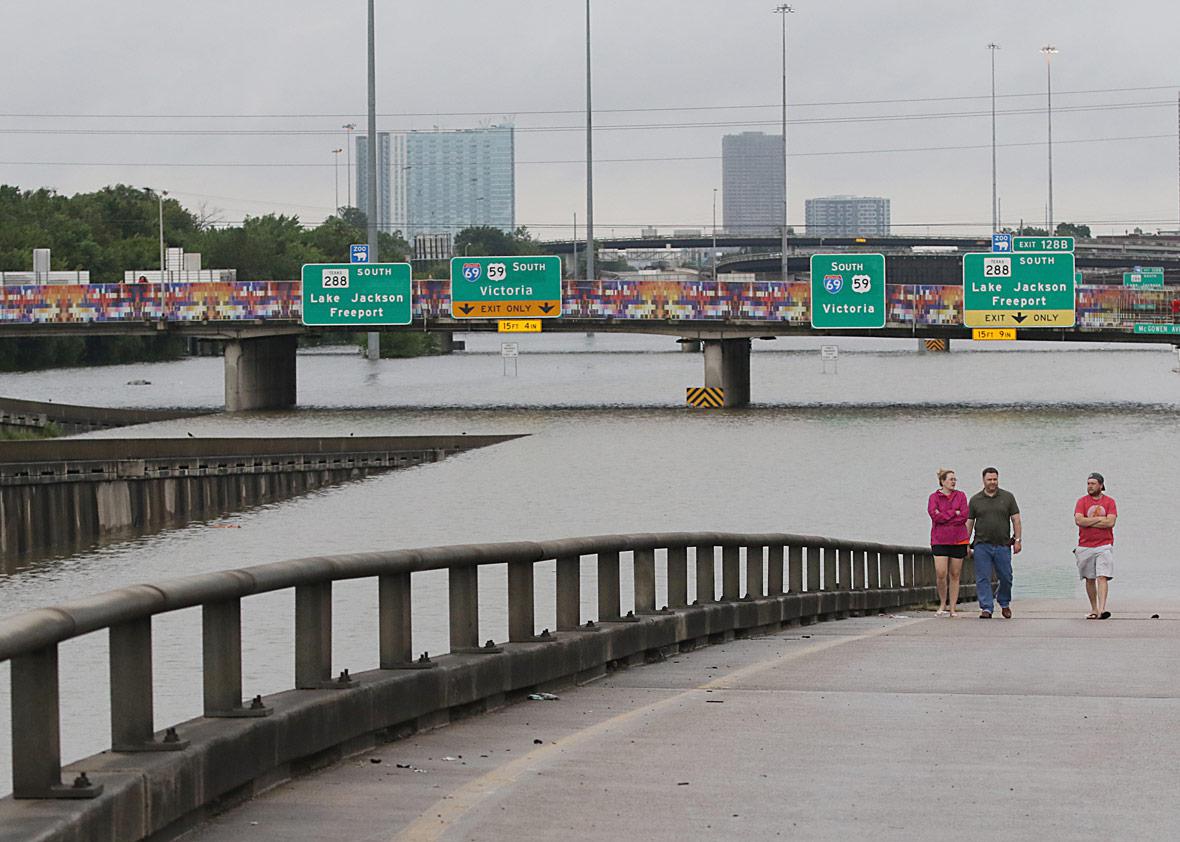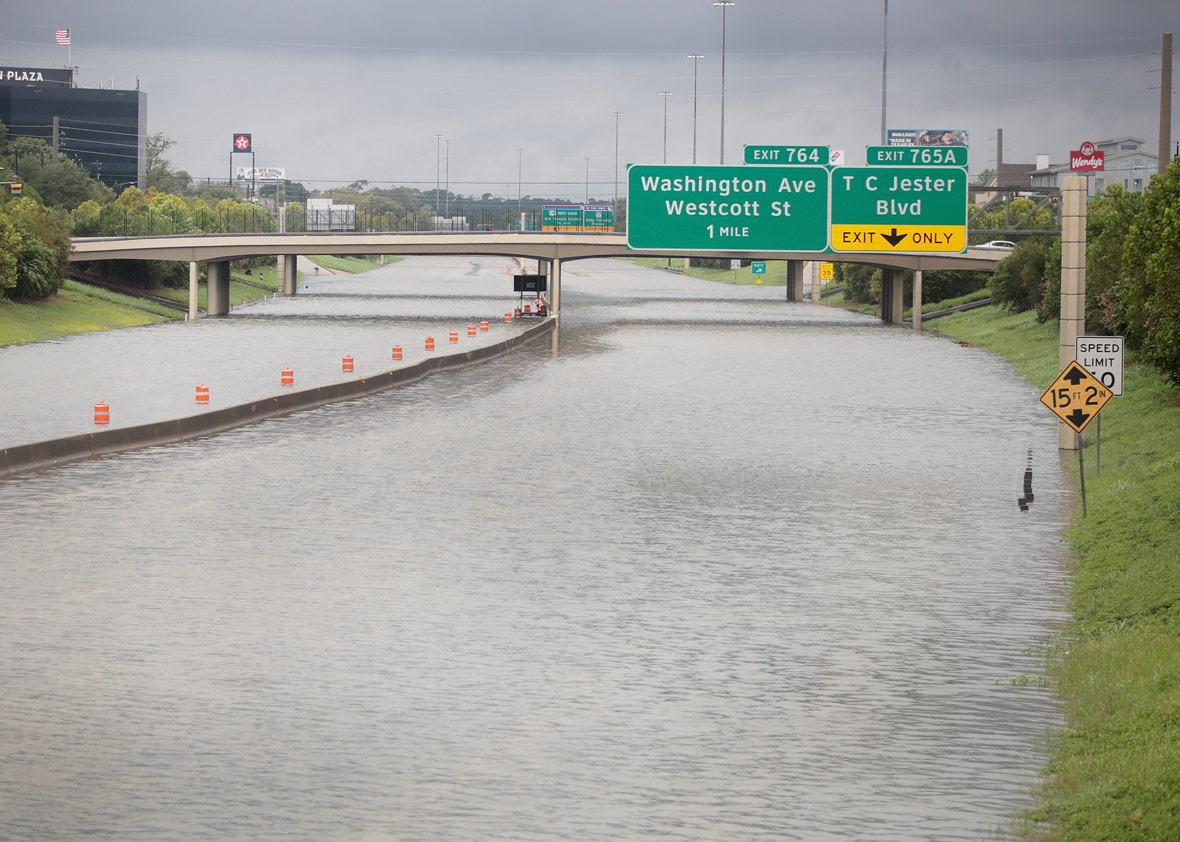It’s too early to tally the economic losses from Hurricane Harvey. But with the waters yet to subside, analysts are already suggesting that the financial impact of Harvey may not be as bad as Katrina was—at least for insurers. As CNBC reported on Monday, “Damages from Harvey, the hurricane and tropical storm ravaging Houston and the Texas Gulf Coast, are estimated to be well below those from major storms that have hit New Orleans and New York, according to [reinsurance company] Hannover Re.”
The analysis may be correct when it comes to the financial losses suffered by insurers. But the suffering is massive—in this natural disaster and in every natural disaster. And while it is understandable to look at Harvey through the lens of Katrina—they’re both hurricanes that swamped low-lying Gulf Coast areas with lots of energy infrastructure—doing so doesn’t provide the clearest possible picture of the economic damage. And it misconstrues the relative importance and economic power of New Orleans and Houston.
For the U.S. economy to lose New Orleans for a couple of weeks was a human and cultural disaster and an economic challenge. For the U.S. economy to lose Houston for a couple of weeks is a human disaster—and an economic disaster, too.

Thomas B. Shea/AFP/Getty Images
The Houston metropolitan area, with a population of well over 6 million, has nearly five times the number of people as the New Orleans metropolitan area. More significantly, Houston has more than five time as many jobs as New Orleans, 3.06 million to 578,000. And they tend to be well-paying jobs. The Houston metropolitan area gross domestic product in 2015 was $503 billion, compared with $78 billion for New Orleans. For any retailer or large e-commerce company, the Houston region likely represents close to 3 percent of annual sales.
Houston, America’s fourth-largest city, has a massive, diversified economy. Sure, New Orleans sits near the mouth of the mighty Mississippi River and is an important entrepôt and site for export of raw materials, agricultural commodities chemicals, and petroleum products. But Houston is a larger, busier, and far more important node in the networked economy. Economies derive their power and influence from their connections to other cities, countries, and markets. And Houston is one of the more connected. It is one of the global capitals of the energy and energy services industries. The Johnson Space Center has 10,000 employees. Houston is home to the headquarters of 20 Fortune 500 companies and the massive MD Anderson Cancer Center. The two airports, George H.W. Bush Intercontinental Airport and William P. Hobby Airport, combined handle about 55 million passengers annually, about five times the number that Louis Armstrong New Orleans International Airport does.
Yes, there’s a degree to which consumption and other economic activity that is forestalled or foregone during a flood is consumption and economic activity deferred. And cleanup efforts tend to be additive to local economies. But in today’s economy, a lot of value can easily be destroyed very quickly. With only a small portion of the housing stock carrying flood insurance, billions of dollars in property will simply be destroyed and not immediately replaced. People who get paid by the hour, or who work for themselves, won’t be able to make up for the income they’re losing a few weeks from now. Hotel rooms and airplane seats are perishable goods—once canceled, they can’t simply be rescheduled. Refineries won’t be able to make up all the time offline—they can’t run more than 24 hours per day. And given that supply chains rely on a huge number of shipments making their connections with precision, the disruption to the region’s shipping, trucking, and rail infrastructure will have far-reaching effects. If you’re a business in Oklahoma or New Mexico, there’s a pretty good chance the goods you are importing or exporting pass through the Port of Houston.
There’s a conventional wisdom that holds that natural disasters aren’t always that bad for the economy. Reconstruction and relief efforts often function as miniature stimulus packages. And many sectors of our economy are indeed highly resilient and flexible—and hence able to weather the storm. Writing in the New York Times earlier this week, Neil Irwin was relatively sanguine about the economic impact of Harvey on the system at large. He noted that any disruption to supply chains was likely to be short-term and that insurers were well-situated to weather the storm. So, yes, it is tough to quibble with the notion that taking a long-term perspective, Harvey will be a blip. But we all know what John Maynard Keynes said about the long run. And in the meantime, there will be a lot of financial and human suffering.
